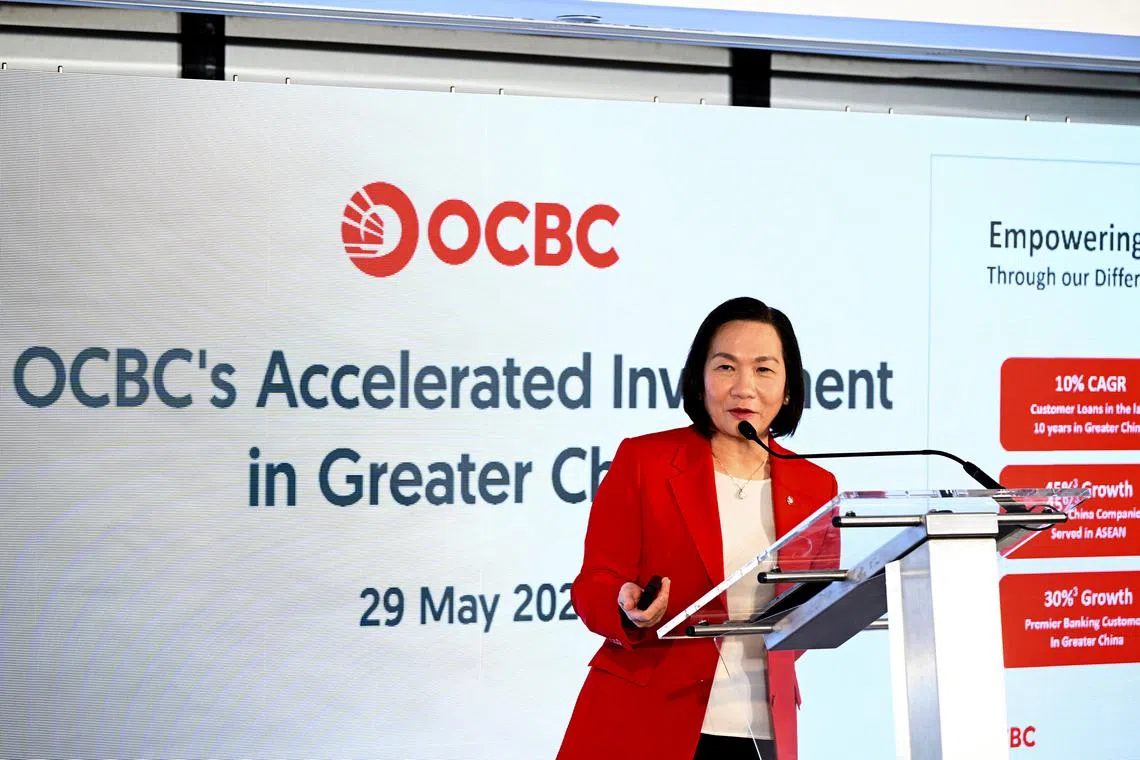OCBC to invest $260 million to grow tech capabilities, office space in Greater China
Sign up now: Get ST's newsletters delivered to your inbox

OCBC chief Helen Wong said China still presents vast opportunities despite the challenges it is facing.
PHOTO: OCBC
HONG KONG – OCBC Bank is ramping up its investments in Greater China as it caters to businesses that are rapidly growing their footprint in South-east Asia.
Singapore’s second-largest bank will pump in HK$1.5 billion (S$260 million) to shore up its tech platforms and grow its office space over the next three years. It will also hire 300 software engineers in Greater China within the same timeframe.
Group chief executive Helen Wong said at a media briefing in Hong Kong on May 29 that the bank hopes to seize opportunities from companies such as big manufacturers, as well as e-commerce, e-sports and fintech firms that are increasingly looking to South-east Asia.
OCBC has 4,500 staff across 67 branches in 17 cities in Greater China – mainland China, Hong Kong, Macau and Taiwan – complemented by its partnership with Bank of Ningbo.
The bank, which counts Singapore, Malaysia, Indonesia and Greater China as its key markets, saw a 45 per cent surge from 2022 to 2023 in the number of Greater China companies it serves in Asean.
Revenue from the Greater China business in Asean rose 39 per cent in the same period.
China still presents vast opportunities despite the challenges it is facing, said Ms Wong. The world’s second-biggest economy is dealing with uneven economic recovery amid a deep property slump and slowing consumer spending.
China’s economy grew by a better-than-expected 5.3 per cent in the first quarter,
That amount of growth in China’s gross domestic product is a “very impressive volume of money”, given the country’s size, Ms Wong told reporters at Regent Hong Kong on May 29.
“So I still feel very confident, as the group takes a longer-term view, that China will continue to be an economic powerhouse… If China grows faster, I think the whole of Asia benefits,” she said, noting that China is the world’s second-biggest spender on research and development.
Asked how China’s slowdown in consumption is affecting trade flows with Asean, OCBC China chief executive Ang Eng Siong said: “China is a very dynamic market – when one door closes, another door opens.
“For instance, we see the slowdown in domestic consumption, but on the other hand, we are also seeing the emergence of new industries, and we’re also seeing a pickup in exports.”
Chinese companies are increasingly looking at entering Malaysia and Indonesia to diversify their supply chains and mitigate the risk of geopolitical tensions, he said.
OCBC is also looking to collaborate with the local authorities in Malaysia and Indonesia to promote Chinese investments into these countries.
“It will be a win-win for our Chinese customers, as well as for these other countries in Asean, (which is) an important network for us,” said Mr Ang.
A key part of growing the business further involves shoring up the bank’s tech capabilities in Greater China.
Earlier in May, the bank launched a digital solution that allows its small and medium-sized enterprise (SME) customers in Hong Kong to set up an account in as quickly as one working day, without having to visit a branch – a process that usually takes up to two weeks.
It has also made progress in other areas, such as standardising half of its systems and extending its enterprise data platform and fraud management system to Hong Kong.
OCBC is investing HK$1 billion to further modernise its technology platform in Hong Kong, with a target to standardise 90 per cent of its systems within three years, in areas such as trade finance, cards and regulatory reporting.
The bank also plans to use HK$500 million to set up a new office in Kowloon, which will be the bank’s third major site in Hong Kong.
Greater China head and Hong Kong chief executive Wang Ke said OCBC aims to be among the top 10 banks in Hong Kong within five years, in terms of assets, revenue, operating or net profit.
“To become a top 10 bank in Hong Kong, we should have more than one measure among these four,” he said.
OCBC currently serves about 10 per cent of Hong Kong’s 360,000 SMEs. The lender said in 2023 that it aimed to onboard 26,000 new SMEs in Hong Kong over the next three years.
Mr Wang believes the digital investments they have made will pay off, and expects growth to kick in during the second half of this year and into 2025.

(From left) Mr Rickie Chan, Bank of Singapore’s Greater China private banking head and Hong Kong branch chief executive officer; Ms Helen Wong, OCBC group CEO; and Mr Wang Ke, OCBC’s Greater China head and Hong Kong chief executive.
PHOTO: OCBC
Wealth management is another area where OCBC is eyeing further growth, as more companies from Greater China set up shop in South-east Asia.
Ms Wong said: “Some bring along their family wealth. Quite a lot of these companies have already established themselves in Hong Kong, and are picking Singapore as a second, further international development opportunity, and from there, going to the rest of the Asean countries.”
OCBC’s private banking arm Bank of Singapore (BOS) aims to grow its assets under management in Hong Kong by 50 per cent by 2026, said Mr Rickie Chan, BOS Greater China private banking head and Hong Kong branch chief executive officer.
Meanwhile in Macau, the bank serves more than 20 per cent of the territory’s population.
“This gives us a unique value proposition, compared with our competitors. We expect OCBC Macau’s strategic importance to increase as the people and business flows in Greater China continue to grow,” said Mr Wang.
OCBC’s plans are part of a broader goal, announced in 2023, to deliver $3 billion in incremental revenue by 2025, on top of its current growth trajectory. It said in May that it has made progress to the tune of $500 million.



